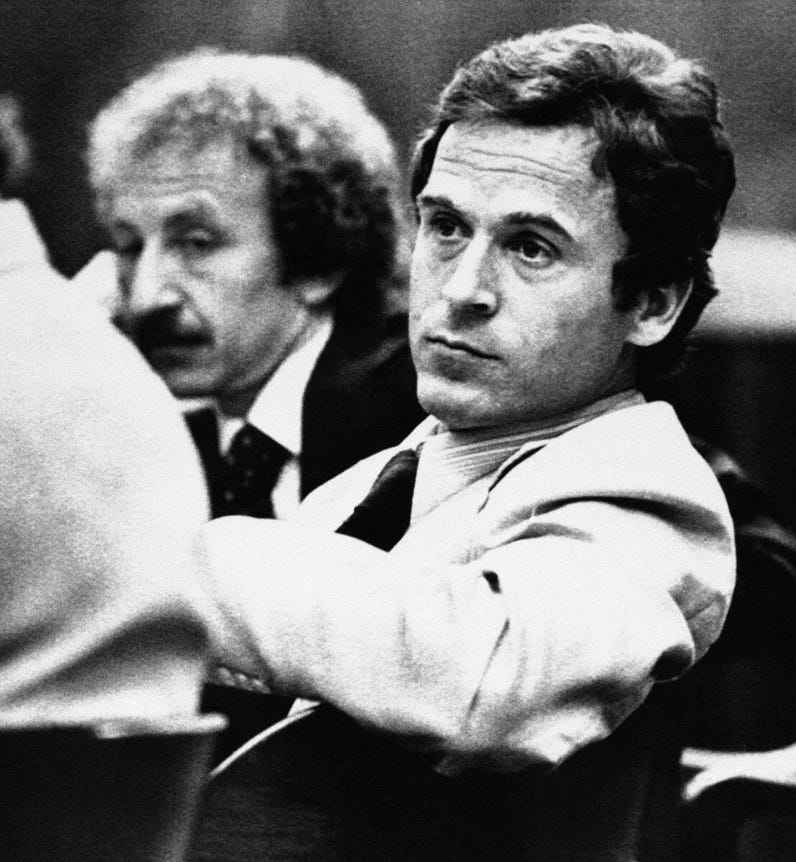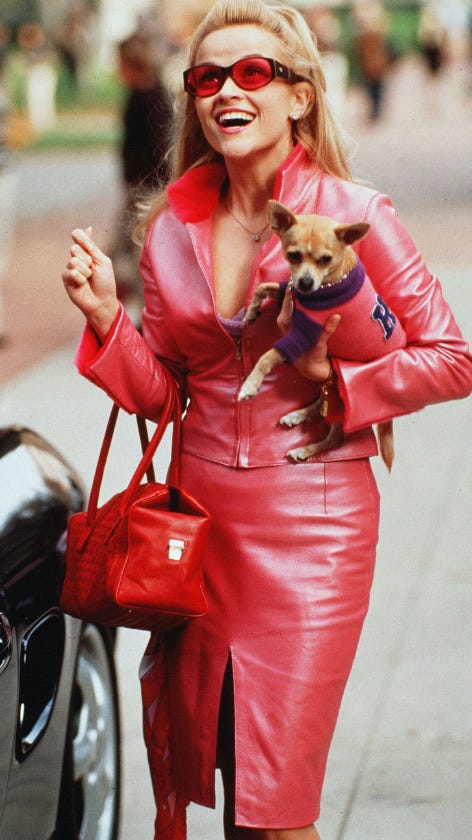Thanks for reading The Powder Room, a safe space to discuss beauty, body culture and identity, with expert recommendations (with a dose of lols.) I write for a living, so please upgrade to a paid subscription with extra content and access; it really means a lot.
There’s an episode of the TV show Curb Your Enthusiasm where comedian Mr Larry David is at a table in a restaurant. He looks over at another part of the room that’s buzzier than his and sees that everyone seated there is much more attractive. He’s perturbed at where he’s been seated. “You know what I think, you have a good-looking section and you have an ugly section,” he tells the maitre d’. It’s a great analogy for so many aspects of life, where appearance could be dictating our success – without us even knowing about it.
The way we look, or pretty privilege, can have a significant impact on our lives. At work, where you’d think that skill would be the number one factor for being hired and paid fairly, looks seem to prevail as an aid to success. Studies have found that an attractive man could make 13 per cent more in his career than a “looks-challenged” colleague, and attractive NFL quarterbacks earn 12 per cent more than their less attractive counterparts.
Our “beauty premium”, a term coined by economist Professor Daniel Hamermesh, author of Beauty Pays: Why Attractive People Are More Successful, correlates our attractiveness with our earning potential. And that can be quantified in cold hard cash: researchers found that attractive people could earn three to four per cent more than those who aren’t as attractive, which adds up to an estimated $230,000 more over a lifetime.
Often behind this is the “attractiveness halo”, when positive attributes are automatically associated with attractive people. Research shows that almost everything that constitutes the conventional beauty standard can mean you’ll earn more money. A study by Harvard University suggested that men who are at least 6ft tall make on average $5,525 more than their 5ft 5in colleagues. The research on this mostly comes down to stereotypes around masculinity and leadership – studies have shown that having a lower-pitched voice can make you seem more trustworthy and make you more money as a result.
“Physically attractive individuals are more likely to advance rapidly in their careers, and they earn higher wages than unattractive individuals”
There are far fewer studies to show the opposite, that being attractive can affect your career negatively. The ones that do tend to be backhanded compliments. One study found that if you are “very unattractive” (their words, not mine), you might feel like you have to work harder to prove yourself and you’ll have less distractions (perhaps a partner or a social life), so you might make more money than an attractive person, which is pretty harsh.
Still, research seems to overwhelmingly favour those with pretty privilege in the workplace. One academic review said that, “Physically attractive individuals are more likely to be interviewed for jobs and hired, they are more likely to advance rapidly in their careers through frequent promotions, and they earn higher wages than unattractive individuals.”
But what counts as unattractive? Anyone outside the small remit of the beauty norm: obesity, people who dress differently, have tattoos or piercings and don’t fit the societal norms of desired appearance in a multitude of ways, according to the review. So, perhaps this is less about appearance, and more about how appearance bias is an invisible force we haven’t even considered – even though we’re likely being judged by it and using it ourselves on a daily basis.
Aside from a better job, what else can being attractive get you? A fair bit, it seems. Everything from superior health, intelligence, dominance and sound mental health can be potentially attributed to a person’s attractiveness. Take the way society seems to baulk at those who are considered handsome being marked as immoral, or even evil. When American serial killer Ted Bundy confessed to the murder of more than 30 young women and girls, he was still inundated with love letters in prison. “He just doesn’t look like the type to kill somebody,” a young woman told a reporter outside the courtroom at his trial in 1979.
Though his crimes were far less brutal, this was also the case with Jeremy Meeks. Meeks’ mugshot had been posted by the Stockton police in California after he’d served various prison terms for crimes such as grand theft auto and gun possession. The picture went viral and Meeks became known as the “hot felon”, which catapulted him to stardom in 2014. He walked in major fashion shows, dated Topshop heiress Ms Chloe Green and reportedly amassed a $4m fortune.
This “pretty equals good” theory could account for the practice of romance scamming in online dating. Usually, the pictures used to lure people into scams are of very attractive people taken from elsewhere. In 2021, a record $547m was swindled by romance scammers according to the Federal Trade Commission.
In 1979, anthropologist Professor Donald Symons proposed that beauty in human faces was based on averageness – our brains act like “face averaging devices” that collect images of the faces we encounter and the composite of this becomes our standard of attractiveness. Where this obviously becomes an issue is that it is dependent on the variety of faces we see. So, when it comes to dating and attraction, this is reliant on who makes up the average faces we are exposed to, from media to our own communities. It might mean that when someone says their “type” is blondes or men over 6ft, for example, that could be based on the average they see day to day – and it could mean that our definition of “attractive” is actually limiting our chances in love.
It’s vital to note that those who have pretty privilege don’t automatically have happier or better lives, nor do they avoid tragedy or heartbreak. They could be judged solely on their appearance negatively – eg, the airhead stereotype – not to mention be subject to harassment. And whatever our experience of it, we do need to examine our own appearance bias because it can have a colossal effect. Many progressive companies have appearance bias as part of their inclusivity training to address the issue of unearned qualities being automatically attributed to some and not to others.
A first step is catching our own internal lookism when it kicks in, by clocking our reactions when characters on TV behave differently than expected, and noticing our own surprise at their behaviour. But there’s also the big-picture realisation – though we are living in an appearance-obsessed world, our looks can change, so it’s crucial to root our self-esteem internally, rather than on outward appearance. Perhaps the way to break the cycle of judging books solely by their covers is to remember that the same is happening to us, too.
Much love
This feature was originally commissioned and published in the Journal by Mr Porter in April 2023.
FURTHER READING:
-Upgrade to paid here.
-Buy ‘UGLY: Why the word became beauty obsessed and how to break free’ in the UK here, in the US here and click here to for other countries.
-Follow me on Instagram here
-Find out more about my work here








Funny how, despite all the above, those "beautiful" people whose looks we aspire to do not seem to have happier lives overall than the rest of us not-specials. I'm thinking of the kaleidoscopic and entertaining cast of stars, celebs and assorted bits of eye-candy who enliven our media landscapes with tale after torrid tale of heartbreak, desertion, divorce and desperate struggles to stay thin, wrinkle-free, dewy, fit and hot. I know it's all click-bait, "the never-ending-saga of" tosh but, even so, what a life, eh? Is being a super-attractive hamster on a treadmill any better than being an average/plain one? Maybe yes in the hamster's head. But only there.
It's true that there is a vast amount of studies and theories on how average is pleasant, but some may argue that the strikingly beautiful people are not average. Those beautiful people you turn around to look at, might have something that sets them apart. A gap in their teeth, a beauty spot, a unibrow, eyes far apart. Something unique and far from average. (also, please help me out with this one because I only have a faint memory of reading about it, the theory that imprisonment for some crimes could be substituted for reverse plastic surgery to make someone look "ugly" therefore ruining their life in society by branding them as "evil". again, can't recollect who said this!)